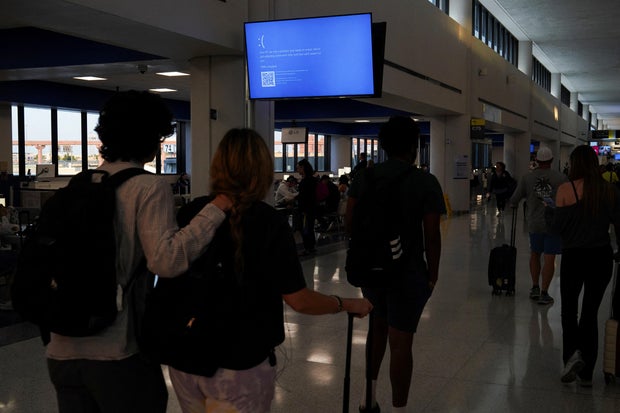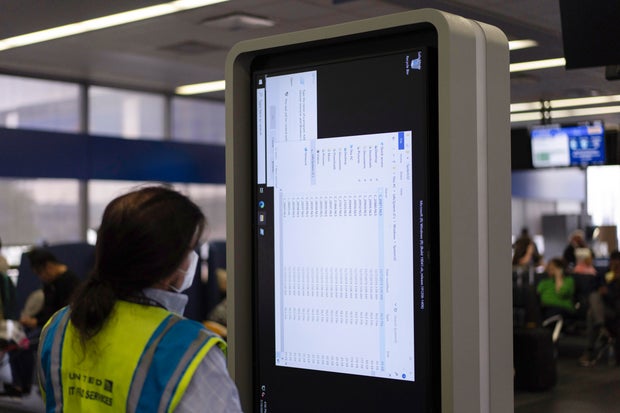[ad_1]
Transport providers, businesses and governments on Saturday are rushing to get all their systems back online after long disruptions following a widespread technology outage.
The biggest continuing effect has been on air travel. Carriers canceled thousands of flights on Friday and now have many of their planes and crews in the wrong place, while airports facing continued problems with check-in and security. On Saturday around 12 p.m. EDT, flight-tracking service FlightAware listed about 23,000 flight delays on its website.
At the heart of the massive disruption is CrowdStrike, a cybersecurity firm that provides software to scores of companies worldwide. The company says the problem occurred when it deployed a faulty update to computers running Microsoft Windows, noting that the issue behind the outage was not a security incident or cyberattack.
The Microsoft outage caused by the CrowdStrike software update also caused the return of a familiar — and dreaded — screen for many Windows users: what has come to be known informally as the “blue screen of death,” indicating that their computer systems are down.
The outage has affected consumers and businesses across the globe, including airlines, banks, health care providers, telecoms, retailers and even billboards in New York City’s Times Square.
In a blog post shared on Saturday morning, Microsoft said it engaged with CrowdStrike to automate work on developing a solution, sharing instructions on how to remedy the issue and deploying “hundreds of Microsoft engineers and experts to work directly with customers to restore services,” among other steps to keep people informed and help affected customers.
Bing Guan / REUTERS
Here’s the latest:
Britain’s transport system still trying to get back on track
LONDON — Britain’s travel and transport industries are struggling to get back on schedule after the global security outage with airline passengers facing cancellations and delays on the first day of the summer holidays for many school pupils.
Gatwick Airport said “a majority” of scheduled flights were expected to take off. Manchester Airport said passengers were being checked in manually and there could be last-minute cancellations.
The Port of Dover said it was seeing an influx of displaced air passengers, with hourlong waits to enter the port to catch ferries to France.
Meanwhile, Britain’s National Cyber Security Center warned people and businesses to be on the lookout for phishing attempts as “opportunistic malicious actors” try to take advantage of the outage.
The National Cyber Security Center’s former head, Ciaran Martin, said the worst of the crisis was over, “because the nature of the crisis is that it went very wrong very quickly. It was spotted quite quickly and essentially it was turned off.”
He told Sky News that some businesses would be able to get back to normal very quickly, but for sectors such as aviation, it would take longer.
“If you’re in aviation, you’ve got people, planes and staffs all stranded in the wrong place… So we are looking at days. I’d be surprised if we’re looking at weeks.”
Germany airline expects most of its flights to run normally
BERLIN — Eurowings, a budget subsidiary of Lufthansa, said it expected to return to “largely scheduled” flight operations on Saturday.
On Friday, the global IT outage had forced the airline to cancel about 20% of its flights, mostly on domestic routes. Passengers were asked to take trains instead.
“Online check-in, check-in at the airport, boarding processes, booking and rebooking flights are all possible again,” the airline said Saturday on X. “However, due to the considerable extent of the global IT disruption there may still be isolated disruptions” for passengers, it said.
Delta Air Lines and its regional affiliates have canceled hundreds of flights
DALLAS — Delta Air Lines and its regional affiliates canceled more than a quarter of their schedule on the East Coast by midafternoon Friday, aviation data provider Cirium said.
More than 1,100 flights for Delta and its affiliates have been canceled. About 40% of the airline’s mainline flights were delayed as of Saturday afternoon, with another 25% canceled. About 40% of regional flights have been canceled, per FlightAware, with Georgia’s Hartsfield–Jackson Atlanta International Airport remaining the epicenter of the disruption.
About half of United Airlines’ flights were delayed as of Saturday afternoon, with another 15% canceled. The airline’s hub airport in Houston is seeing the worst of the delays.
American Airlines’ network had canceled 450 flights, 7.5% of its schedule, and is viewing Saturday as a recovery day.
Southwest and Alaska do not use the CrowdStrike software that led to the global internet outages and had canceled fewer than a half-dozen flights each.
Portland, Oregon, mayor declares an emergency over the outage
PORTLAND, Ore. — Mayor Ted Wheeler declared an emergency Friday after more than half of the city’s computer systems were affected by the global internet outage.
Wheeler said during a news conference that while emergency services calls weren’t interrupted, dispatchers were having to manually track 911 calls with pen and paper for a few hours. He said 266 of the city’s 487 computer systems were affected.
Border crossings into the U.S. are delayed
SAN DIEGO — People seeking to enter the U.S. from both the north and the south found that the border crossings were delayed by the internet outage.
The San Ysidro Port of Entry was gridlocked Friday morning with pedestrians waiting three hours to cross, according to the San Diego Union-Tribune.
Even cars with people approved for a U.S. Customers and Border Protection “Trusted Traveler” program for low-risk passengers waited up to 90 minutes. The program, known as SENTRI, moves passengers more quickly through customs and passport control if they make an appointment for an interview and submit to a background check to travel through customs and passport control more quickly when they arrive in the U.S.
Meanwhile, at the U.S.-Canada border, Windsor Police reported long delays at the crossings at the Ambassador Bridge and the Detroit-Windsor tunnel.
Carolyn Kaster / AP
[ad_2]
Source



Leave a Reply